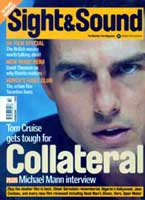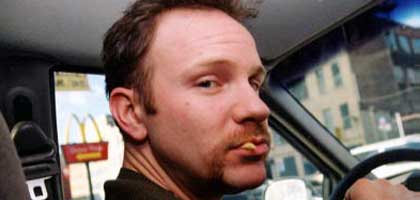
Super Size Me
USA 2004

Reviewed by Leslie Felperin
Synopsis
Our synopses give away the plot in full, including surprise twists.
A documentary in which Manhattan-based director Morgan Spurlock decides to test the claim of fast-food chain McDonald's, asserted in court when two overweight teenage girls attempted to sue the company over their obesity, that McDonald's food could form part of a “nutritious diet”. Spurlock resolves to eat only food from McDonald's for a month, and lays extra ground rules for the experiment: every time a server asks him if he wants to 'super-size' his meal, he has to say 'yes'; he must try everything on the menu at least once; and additionally he limits his daily exercise to walking no more than a mile a day.
After a full physical which finds him in the peak of health, Spurlock starts eating McDonald's - and promptly vomits after his first super-sized meal. His girlfriend Alex, a vegan chef, tries to persuade him to quit, as do his doctors. Spurlock interviews passionate McDonald's fans, a surgeon general who warns of the dangers of fast food, nutritionists, anti-fast-food campaigners and a lobbyist for the fast-food industry who says that “We're part of the problem [of nationwide obesity] and we're part of the solution.” However, no one from McDonald's agrees to speak to Spurlock, despite repeated requests for an interview.
Having illustrated how battery chickens become Chicken McNuggets, how fast-food addiction can be likened to drug addiction and how McDonald's aggressively markets itself to children, Spurlock completes the experiment having gained 25 pounds, developed high cholesterol levels and turned his liver “to foie gras”, in the words of one doctor. Subtitles explain that the two teenage girls who tried to sue the company lost their case but, since the release of the film in the US, McDonald's has withdrawn the Super Size option.
Review
If nothing else, Super Size Me's director Morgan Spurlock has emerged as a threat to the supremacy of at least one heavyweight: Michael Moore. Although his documentary technique owes much to Moore's muckraking, occasionally whimsical style (particularly in the series TV Nation and The Awful Truth), Spurlock's film unveils a disciple on the cusp of exceeding his master. Released in the US before Moore's more-generously budgeted, better-hyped but ultimately scattershot and sloppy Fahrenheit 9/11, Super Size Me offers a rigorously argued portion of investigative journalism that hits the spot, served up with a smile by Spurlock - a far more likeable, seemingly less ego-driven presence than Moore.
Imposing on himself the challenge to eat nothing but McDonald's food for 30 days, Spurlock uses Jackass-style masochistic, extreme sportsmanship spirit (without the athletic prowess, since he pledges to exercise as little as possible) to illustrate how obesity and other health problems are related to corporate greed. Viewers should be warned this is not a pretty sight. There's the now-infamous scene of Spurlock vomiting after his first super-sized meal and footage of a man having stomach surgery, both of which might induce nausea in squeamish spectators. Plus Spurlock has cameraman Scott Ambrozy get so close up while he's eating, it borders on endoscopy.
The result is more than just a rousing indictment of the famously litigious fast-food giant (which has not sued Spurlock, though its marketing departments have aggressively rebutted the film). High-powered lobbyists, laissez-faire governments and lazy, carb-guzzling citizens are all proved complicit in worldwide nutritional suicide. Moreover, the victims are not just adults, like Spurlock and the more than fully grown McDonald's devotees he meets, who choose to eat the stuff cognisant of its dangers: Spurlock lays out the sinister marketing methods used by the burger merchants to target children. Flashing up the face of the company's mascot Ronald McDonald, Spurlock slyly slips Curtis Mayfield's 'Pusher Man' on the soundtrack.
Nevertheless, it's the film and its hero's honest approach that make the package so persuasive. Some of that might be put down to cheap-and-cheerful aesthetics. The digitally shot picture, all muffled sound and grainy texture, spotty as Spurlock by the end of the affair, looks like it was made for the price of a few thousand Happy Meals (reportedly the budget was $65,000), but is still visually interesting, with factoids tickertaped across the screen and split-screen effects for a few eye-catching montages.
While Spurlock never disguises his contempt for McDonald's methods, he winningly admits that eating their food every day, three times a day, is every eight-year-old's dream come true. It's to his further credit that his girlfriend Alex is shown reporting a decline in his sexual performance since he started shovelling in the fries. Unlike Moore, who likes to make a big fuss of doorstepping corporate and political headquarters with a camera crew in tow, Spurlock shows himself quietly sitting in his own office repeatedly trying to get an interview with McDonald's Orwellian-titled Head of Corporate Communication and Social Responsibility. Most horrifying is the concluding M&M® McFlurry® of statistics (more than a million animals are eaten every hour in the US, for example) - that and the scene of Spurlock upchucking his dinner in the restaurant car park, his first inkling that the whole ordeal might not be as much fun as an eight-year-old would imagine.
Credits
- Director
- Morgan Spurlock
- Produced by
- Morgan Spurlock
- The Con
- Screenplay
- Morgan Spurlock
- Director of Photography
- Scott Ambrozy
- Editors
- Stela Georgieva
Julie 'Bob' Lombardi - Art Direction
- Joe the Artist
- Original Music
- Steve Horowitz
